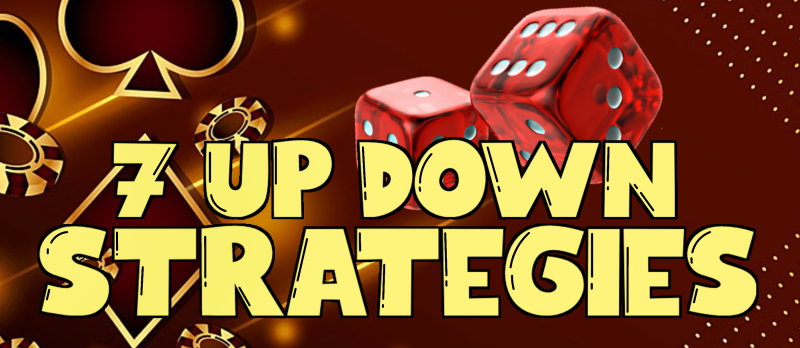Enter the world of 7 Up Down strategies, where mastering this timeless card game is the gateway to victory. With its reputation for simplicity and strategic depth, 7 Up Down offers players a captivating challenge that rewards keen decision-making and foresight.

Brief Overview of 7 Up Down
7 Up Down stands as a testament to the enduring appeal of card games, captivating players with its easy-to-understand rules and challenging gameplay. Whether played casually among friends or in competitive settings, 7 Up Down rewards players who can anticipate their opponents’ moves and make calculated decisions. Its blend of luck and skill makes every hand a thrilling opportunity for victory.
Unraveling Card Values: A Comprehensive Guide to Understanding Card Rankings and Point Systems
Understanding the values assigned to playing cards is fundamental to mastering various card games, from classics like Poker to modern favorites like Blackjack. In this detailed exploration, we delve into the intricate world of card values, shedding light on the significance of rankings and point systems across different games. Whether you’re a novice player seeking to grasp the basics or a seasoned enthusiast looking to refine your strategy, this guide will equip you with the knowledge needed to navigate the complexities of 7 Up Down Strategies with confidence.
Importance of Card Values in Gaming
Card values form the backbone of countless card games, dictating the hierarchy of hands, determining winning combinations, and influencing strategic decisions. Here’s an overview of why understanding card values is essential in the realm of gaming:
- Hand Rankings: In many card games, including Poker and Bridge, hand rankings are determined by the values assigned to individual cards. Players aim to form the highest-ranking hand possible based on the specific rules of the game, with each card contributing to the overall strength of the hand.
- Point Systems: Card games often employ point systems to assign numerical values to cards, which in turn impact scoring and gameplay dynamics. By understanding these point systems, players can assess the value of their hands, strategize accordingly, and optimize their chances of success.
- Decision-Making: Knowledge of card values enables players to make informed decisions during gameplay, such as when to fold, raise, or bluff in Poker, or when to hit, stand, or double down in Blackjack. By evaluating the potential value of their hands relative to those of their opponents, players can devise effective strategies to outmaneuver their adversaries.
- Game Variants: Different card games feature distinct variations in card values and point systems, necessitating adaptability and a comprehensive understanding of the rules. Whether it’s the nuanced scoring mechanisms of Rummy or the strategic nuances of Baccarat, familiarity with card values is paramount for success in diverse gaming environments.
Explore our comprehensive guide to 7 Up Down Strategies for valuable insights and techniques to elevate your card gaming proficiency. Unlock the secrets of strategic gameplay and enhance your competitive edge with our expert tips and strategies.
Key Principles of Card Values
To navigate the complexities of 7 Up Down Strategies effectively, it’s essential to grasp the key principles underlying card values and their implications for gameplay. Here are the fundamental principles to consider:
- Numeric Values: In most standard decks of playing cards, numeric cards are assigned values corresponding to their face value (e.g., 2 through 10). These cards contribute their numerical value to the total score or ranking of a hand in accordance with the rules of the game.
- Face Cards: Face cards, including Jacks, Queens, and Kings, typically carry higher point values than numeric cards and are often integral to forming winning combinations in various games. While their specific values may vary depending on the game, face cards generally command greater strategic importance due to their potential for high-scoring hands.
- Aces: Aces are unique in their versatility, often serving as both high and low cards depending on the context of the game. In some games, such as Blackjack, Aces can be valued at either 1 or 11 points, offering players strategic flexibility in crafting winning hands.
- Suit Hierarchies: Certain card games incorporate suit hierarchies, where specific suits are assigned greater or lesser significance relative to others. Understanding these hierarchies can influence gameplay decisions, particularly in games where suit composition affects hand strength or scoring.
In conclusion, a comprehensive understanding of card values is indispensable for success in card gaming, providing the foundation upon which strategic decisions are made and gameplay unfolds. By mastering the nuances of 7 Up Down Strategies, players can harness the power of card values to outmaneuver their opponents, achieve victory, and elevate their gaming experience to new heights.
Decoding Opponents’ Moves: Strategies for Analyzing and Anticipating Actions in 7 Up Down
In the realm of 7 Up Down Strategies, a keen understanding of your opponents’ moves is paramount to success. By analyzing their actions, anticipating their next steps, and adapting your gameplay accordingly, you can gain a strategic advantage and increase your chances of victory. In this comprehensive guide, we delve into the art of deciphering opponents’ moves, offering valuable insights and techniques to enhance your strategic prowess in 7 Up Down.
The Importance of Analyzing Opponents’ Moves
Analyzing your opponents’ moves is a cornerstone of strategic gameplay in 7 Up Down Strategies. By scrutinizing their actions, you can glean valuable information about their intentions, tendencies, and potential strategies. Here’s why analyzing opponents’ moves is essential:
- Information Gathering: Each move made by your opponents provides valuable clues about their hand strength, objectives, and possible strategies. By carefully observing their actions, you can gather information that informs your own decision-making process and allows you to make more informed plays.
- Predictive Analysis: Analyzing opponents’ moves enables you to anticipate their future actions and plan your responses accordingly. By identifying patterns, tendencies, and tells in their gameplay, you can develop counter-strategies to exploit their weaknesses and capitalize on opportunities.
- Adaptability: Effective analysis of opponents’ moves allows you to adapt your own strategy in real-time, responding dynamically to changing circumstances and optimizing your chances of success. Whether it’s adjusting your betting patterns, altering your card selection, or bluffing strategically, adaptability is key to staying ahead of the competition.
- Psychological Warfare: In addition to providing tactical insights, analyzing opponents’ moves can also be a form of psychological warfare, influencing their decision-making process and inducing them to make suboptimal plays. By projecting confidence, uncertainty, or ambiguity through your own actions, you can manipulate your opponents’ perceptions and gain a strategic edge.
Explore our advanced strategies and techniques for analyzing opponents’ moves in 7 Up Down Strategies. Elevate your gameplay to new heights and outmaneuver your adversaries with our expert insights and tips by clicking this link.
Effective Techniques for Analyzing Opponents’ Moves
To effectively analyze opponents’ moves in 7 Up Down Strategies, players must employ a combination of observational skills, critical thinking, and psychological insight. Here are some proven techniques for dissecting and deciphering your opponents’ actions:
- Observational Skills: Pay close attention to your opponents’ betting patterns, card selections, and body language to gather valuable information about their hand strength and intentions. Look for deviations from their typical behavior and identify potential patterns or tells that may betray their strategy.
- Positional Awareness: Consider the relative position of your opponents at the table and how it influences their range of possible actions. Players in early positions may adopt different strategies than those in late positions, and understanding these dynamics can inform your analysis of their moves.
- Hand Reading: Develop the ability to “read” your opponents’ hands based on their actions throughout the hand. Consider the range of hands they could reasonably hold given their preflop actions, betting behavior, and reactions to community cards, and use this information to narrow down their likely holdings.
- Table Dynamics: Take into account the overall dynamics of the table, including player tendencies, stack sizes, and previous interactions, when analyzing opponents’ moves. Contextual factors such as recent showdowns, betting trends, and table image can provide valuable insights into their decision-making process.
In conclusion, mastering the art of analyzing opponents’ moves is essential for success in 7 Up Down Strategies. By honing your observational skills, employing effective techniques, and maintaining a strategic mindset, you can gain a competitive edge over your adversaries and elevate your gameplay to the next level.
Strategic Discarding in 7 Up Down Strategies: Maximizing Efficiency and Minimizing Risk
In the realm of 7 Up Down Strategies, strategic discarding plays a crucial role in shaping the outcome of each hand. By carefully selecting which cards to discard and when to do so, players can optimize their chances of building winning hands while minimizing the risk of being left with undesirable cards. In this comprehensive guide, we delve into the art of strategic discarding, offering valuable insights and techniques to enhance your gameplay in 7 Up Down.
The Importance of Strategic Discarding as a means of 7 Up Down Strategies
Strategic discarding is a fundamental aspect of 7 Up Down Strategies, influencing the composition of players’ hands and shaping their overall strategy. Here’s why strategic discarding is essential:
- Hand Optimization: Discarding strategically allows players to tailor their hands to maximize their potential for winning combinations. By removing cards that are unlikely to contribute to strong hands and retaining those with greater potential, players can increase their chances of success in subsequent rounds.
- Risk Management: Strategic discarding helps players mitigate risk by minimizing the likelihood of being left with undesirable cards. By carefully evaluating the value of each card in their hand and considering potential future draws, players can make informed decisions that reduce the probability of being dealt unfavorable cards.
- Adaptability: Effective discarding requires players to remain flexible and adapt their strategy based on changing circumstances. Whether adjusting to the shifting dynamics of the game, responding to opponents’ actions, or capitalizing on emerging opportunities, adaptability is key to successful discarding.
- Information Gathering: Discarding strategically can also serve as a form of information gathering, providing valuable insights into opponents’ hands and strategies. By observing their discards and reactions, players can infer the strength of their opponents’ hands and adjust their own strategy accordingly.
Effective Techniques for Strategic Discarding
To discard effectively in 7 Up Down Strategies, players must consider a variety of factors, including hand strength, potential combinations, opponent tendencies, and future card possibilities. Here are some proven techniques for strategic discarding:
- Evaluate Hand Strength: Assess the strength of your current hand and identify cards that are unlikely to contribute to potential winning combinations. Prioritize discarding cards that are of little value in forming strong hands and retain those that have the potential to create winning combinations.
- Consider Potential Combinations: Anticipate potential combinations that can be formed with the remaining cards in your hand and discard accordingly. Aim to maintain flexibility and keep options open for building strong hands in future rounds.
- Observe Opponent Discards: Pay close attention to the discards made by your opponents and use this information to infer the strength of their hands and potential strategies. Look for patterns or tendencies in their discarding behavior and adjust your own strategy accordingly.
- Plan Ahead: Anticipate future card draws and consider how they may impact your hand. Discard cards that are less likely to synergize with future draws and prioritize retaining cards that have the potential to form strong combinations with upcoming cards.
Explore our advanced techniques and strategies for strategic discarding in 7 Up Down Strategies. Elevate your gameplay to new heights and outmaneuver your adversaries with our expert insights and tips Hobi Games Pro.
In conclusion, strategic discarding is a cornerstone of successful gameplay in 7 Up Down Strategies. By mastering the art of discarding strategically, players can optimize their hand composition, minimize risk, and gain a competitive edge over their opponents. Explore our expert techniques and elevate your gameplay to new heights with our comprehensive guide to strategic discarding.






